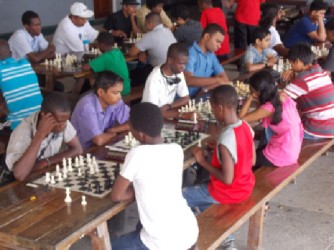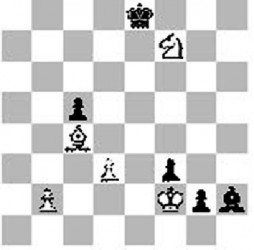The London 2013 Candidates chess tournament will be remembered not only for its high quality of play, but also for the extraordinary collective talents of its eight participants. Simply put, with just a few exceptions, the participants represented the cream of human chess players on the planet.
Chess has been celebrated for its prodigies, much like music and mathematics. The talents which we call ‘extraordinary’ are rare, becoming famous over time. We are familiar with such names as Wolfgang Amadeus Mozart, or Beethoven, or the erudite Indian mathematician who invented the zero. They are all matched with the likes of Fischer, the Cuban master Jose Raul Capablanca, who sat on his father’s legs at age four and pointed out the mistake he had made during a previous game, or the great Dr Alexander Alekhine who it is said “shook complicated chess combinations out of his sleeves” reminiscent of a magician. The London 2013 Candidates, eerily, boasted talent not far removed from the inner circle of geniuses whom I mentioned.
 The contingent was headed by prodigy Magnus Carlsen, a 22-year-old professional chess player from Norway, who is ranked high, or you can say, has the highest ELO chess rating, 2872, for any human among the seven billion residents on Planet Earth. Carlsen has gone where no man has ventured before. He surpassed the mighty Garry Kasparov’s record of ELO 2851. There was Vladimir Kramnik, a former world champion. He took the championship from Kasparov in London 2000. And the Israeli Boris Gelfand, who played Vishy Anand for the world championship title, and lost. Grishuk, Aronian, Ivanchuk, Svidler, and Radjabov completed the eight. Each was as dangerous as the other, as Ivanchuk would demonstrate when he out-manoeuvred Kramnik in the final round of the tournament, or Svidler as he outplayed Carlsen.
The contingent was headed by prodigy Magnus Carlsen, a 22-year-old professional chess player from Norway, who is ranked high, or you can say, has the highest ELO chess rating, 2872, for any human among the seven billion residents on Planet Earth. Carlsen has gone where no man has ventured before. He surpassed the mighty Garry Kasparov’s record of ELO 2851. There was Vladimir Kramnik, a former world champion. He took the championship from Kasparov in London 2000. And the Israeli Boris Gelfand, who played Vishy Anand for the world championship title, and lost. Grishuk, Aronian, Ivanchuk, Svidler, and Radjabov completed the eight. Each was as dangerous as the other, as Ivanchuk would demonstrate when he out-manoeuvred Kramnik in the final round of the tournament, or Svidler as he outplayed Carlsen.
For each country represented, the stakes were enormous. Forget the prize money; the prestige was what was all consuming. It gave the winner of the tournament an opportunity to play for the coveted world championship title, and to have the attention of approximately one billion chess players. It was a question of pride. Carlsen emerged the victor of the tournament as predicted, although himself and Kramnik finished on a tie with the same number of points. What caused the difference, however, was that Carlsen had five wins to Kramnik’s four. Wins are more esteemed in chess than draws when using the tie-break systems.
So India, Vishy Anand, and Norway, Magnus Carlsen, in a duel of champions, will clash for the ultimate prize in chess, the world championship title. Hegemony in chess had traditionally belonged to Russia and the Soviet Union, but now that has shifted. Times have changed. The Chinese are rapidly rising to stardom, closely matched by the European nations. Africa is on the rise also. In the sixties Brazil boasted a prodigy in Henrique Mecking, but that era belonged to Fischer. Now it is India, the country where the game was born.
The Government of India wants the championship to be held in Chennai, the home town of Anand. The government, through its Chief Minister of Tamil Nadu, Jayalalithaa Jayaram, made a bid on the floor of the assembly for Rs 29 crore, equivalent to US5.3 million to host the championship.

She contended that by hosting the international championship, more persons would become familiar with the game and that it would lead to the creation of more champions. When Anand had played Gelfand in 2011, Chennai had sent out a bid, but Moscow entered a higher bid and Chennai lost. The championship is scheduled to be played from November 6 to 26, 2013.
London FIDE Candidates (14) Carlsen, Magnus Svidler, Peter WH
 WHITE RESIGNS ..
WHITE RESIGNS ..
1. e4 e5 2. Nf3 Nc6 3. Bb5 a6 4. Ba4 Nf6 5. O-O Be7 6. d3 b5 7. Bb3 d6 8. a3 O-O 9. Nc3 Bb7 10. Bd2 Qd7 11. a4 Nd8 12. axb5 axb5 13. Rxa8 Bxa8 14. Ne2 Ne6 15. Ng3 c5 16. Nf5 Bd8 17. c4 bxc4 18. Bxc4 Bc7 19. Re1 Re8 20. Qc1 Nh5 21. g3 g6 22. Nh6 Kg7 23. Ng5 Nxg5 24. Bxg5 d5 25. exd5 Bxd5 26. Ng4 Bf3 27. Bf6 Kg8 28. Nh6 Kf8 29. Qe3 Bb7 30. Bh4 Qh3 31. f3 Nf4 32. gxf4 Qxh4 33. Nxf7 Bxf3 34. Qf2 Qg4 35. Qg3 exf4 36. Rxe8 Kxe8 37. Qxg4 Bxg4 38. Ng5 h6 39. Nf7 h5 40. Nh6 Bd1 41. Kf2 f3 42. h3 Bf4 43. Nf7 g5 44. Ke1 g4 45. hxg4 hxg4 46. Kxd1 g3 47. Ke1 g2 48. Kf2 Bh2
0-1





